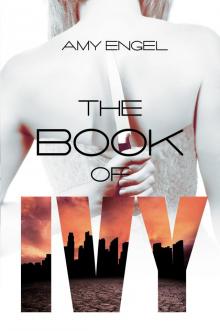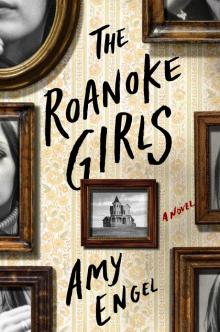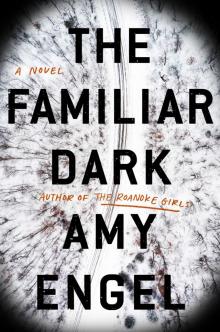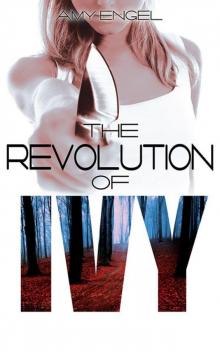The Revolution of Ivy Read online
Beyond the fence. I am still alive. Barely.
My name is Ivy Westfall. I am sixteen years old and a traitor. Three months ago, I was forced to marry the president’s son, Bishop Lattimer—as all daughters of the losing side of the war are sold off in marriage to the sons of the winners. But I was different. I had a mission—to kill Bishop.
Instead, I fell in love with him.
Now I am an outcast, left to survive the brutal savagery of the lands outside of civilization. Yet even out here, there is hope. There is life beyond the fence. But I can’t outrun my past. For my actions have set off a treasonous chain of events in Westfall that will change all of our fates—especially Bishop’s.
And this time, it is not enough to just survive…
Table of Contents
Dedication
Chapter One
Chapter Two
Chapter Three
Chapter Four
Chapter Five
Chapter Six
Chapter Seven
Chapter Eight
Chapter Nine
Chapter Ten
Chapter Eleven
Chapter Twelve
Chapter Thirteen
Chapter Fourteen
Chapter Fifteen
Chapter Sixteen
Chapter Seventeen
Chapter Eighteen
Chapter Nineteen
Chapter Twenty
Chapter Twenty-One
Epilogue
Acknowledgments
About the Author
Experience Ivy’s story from the very beginning… The Book of Ivy
Discover more Entangled Teen titles… Awakening
The Body Institute
Forget Tomorrow
Perfected
This book is a work of fiction. Names, characters, places, and incidents are the product of the author’s imagination or are used fictitiously. Any resemblance to actual events, locales, or persons, living or dead, is coincidental.
Copyright © 2015 by Amy Engel. All rights reserved, including the right to reproduce, distribute, or transmit in any form or by any means. For information regarding subsidiary rights, please contact the Publisher.
Entangled Publishing, LLC
2614 South Timberline Road
Suite 109
Fort Collins, CO 80525
Visit our website at www.entangledpublishing.com.
Entangled Teen is an imprint of Entangled Publishing, LLC.
Edited by Alycia Tornetta
Cover design by Alexandra Shostak
Girl (c) Yeko Photo Studio/Shutterstock
Background (c) Tom Tom/Shutterstock
Knife (c) Mark William Perry/Shutterstock
ISBN 978-1-63375-116-3
Manufactured in the United States of America
First Edition November 2015
For Holly,
my sister in all the ways that matter.
Tears slip down my cheeks, their salt stinging my lips. I give in, allow myself to weep for everything I’ve lost, for the fear of what’s to come. I grieve the daughter I was, the wife I never wanted to be, the killer I refused to become, the traitor I pretended to be.
I am none of those things now. I raise my head and wipe my eyes. Daughter. Wife. Killer. Traitor. They are all old versions of me. Now I will become a survivor.
I take a deep breath and let go of the fence.
Chapter One
No one survives beyond the fence. At least that’s what my father always told me when I was a child. But I’m not a little girl anymore, and I no longer believe in the words of my father. He told me the Lattimers were cruel and deserved to die. He told me my only choice was to kill the boy I loved. He has been wrong about so many things. And I’m determined that he’s going to be wrong about my survival as well.
If I want to live, I have to move away from the fence and head toward the river. But even after I start that direction, my fingers still clench and release, clench and release, as if they are searching the air for the comforting familiarity of chain link. I know that last night I was lucky, considering what could have happened while I was passed out and injured on the wrong side of the fence. An animal could have found me. Or a person. I can’t count on that type of luck again. I need to reach the river, quench my thirst before the sun sets, and find some shelter from the coming night.
The river can’t be far, but it still takes what feels like hours for me to get there. I lose count of how many times I have to stop and rest, my breathing ragged and my body aching. My thoughts move sluggishly inside my head, and dizziness is an ever-present companion, hovering over me, waiting for a moment of weakness. I probably have a concussion from the blow to my head, but I’m not sure I remember what you’re supposed to do for one. And it’s not like I can put my feet up anyway, grab a cold compress, ask someone else’s opinion. A laugh bubbles in my throat, but when it breaks free all it sounds is wild, just this side of insane, and I press my lips together tight.
Keeping my thoughts from returning to Westfall takes almost as much effort as walking. But I push the memories aside. Out here, longing for things that are no longer mine will only lead to weakness that will be my downfall. Instead, I concentrate on the simple act of putting one foot in front of the other and continue moving forward even as part of me is left behind, beyond a fence I cannot breach.
When I finally reach the river, it’s not a placid pool like Bishop showed me inside Westfall’s borders. Here it’s wide, and although not raging, the current is running strong. The water looks brownish in the afternoon sun, silt stirred up by the rush of water. But when I kneel on the riverbank and cup it in my hands, it is mostly clear, and I gulp it down. I reach with both hands and shovel it toward my open mouth as fast as I can. I hadn’t realized how thirsty I was until the first drops hit my tongue.
Once I’ve slackened my immediate thirst, I splash water onto my face. I take off my sweater and set it on the bank beside me, then cup handfuls of water and scrub gingerly at my face and neck, cataloging injuries as I go. The guards who threw me out were definitely not careful with me. My lower lip feels puffy and raw, and the back of my head is so tender I can’t even run my fingers over it without sucking air in through gritted teeth. My arms are crisscrossed with dozens of deep scratches. I plunge my hands into the cold water and rub the blood away, try to work the dirt out from underneath my nails.
The sun is beginning to sink lower in the sky, and a thin strip of light cuts through the trees and glances off my wedding ring. I straighten my left hand out underneath the water, watch the gold glimmer and shift. I remember the day Bishop put it on my finger, the way my hand shook. The way I wanted to rip the ring off, how foreign and confining it felt against my skin. Now it takes me a long minute to work the ring off my finger. It leaves behind a dent in my flesh, a smooth band of skin that feels naked without it. But I can’t bear to wear it anymore, this reminder of all the things I have lost. I hold the ring loosely in my palm, and then open my hand, let the river carry it away.
I scoot back on the riverbank, content for the moment to listen to the play of water over rocks, feel the warmth of the fading sun on my back. I try not to think about the coming night. I try not to think about anything beyond my basic needs, afraid that if I do I will simply collapse under the weight of my fear and grief. There’s no room for second-guessing the decisions I made back in Westfall. No room for wondering what might have been. I don’t consider myself a victim—it was my choice to sacrifice myself, after all—but out here, turning into one will be easy if I don’t stay focused.
Behind me there is a small stand of trees, as good a place as any to take refuge once darkness falls. My more immediate worry, now that thirst isn’t at the top o
f the list, is finding something to eat. My father, in all his endless lessons, never spared a single second talking to me about how to survive beyond the fence. He never taught me how to start a fire or catch a small animal. I suppose he never considered the possibility that all his planning might come to nothing, that we might be caught, that he might need to give me some kind of alternative training. It is just one more time he has failed me.
A slight movement to my right catches my attention and I watch as a small lizard scampers across the rocks, stopping to sun himself. I hold my breath, willing him closer, although I’m not entirely sure what I’ll do with him if I’m able to catch him. But the gnawing hunger in my stomach forces me to try. I lean my weight onto my left arm and inch my right hand closer. At the last second the lizard must sense my intent because he tries to scuttle away, but I’m faster, or more desperate, and my fingers close around his scaly back.
I hold him in my fist, and he stares at me with dull black eyes. I pick up a small rock and use it to crush him, ignoring the bile that fights its way into my throat. I eat methodically, not allowing myself to think, trying not to taste the bitter tang that coats my mouth. It takes all my concentration to swallow, my eyes focused on a spot across the river. My stomach wants to heave the lizard back up, but when I’m done I set my jaw, take deep breaths through my nose. My days of eating Bishop’s hamburgers and turkey sandwiches are over. Now I will eat whatever it takes to stay alive.
When I’m sure the lizard is going to stay down, I crawl forward and rinse my mouth with water. I swish and spit until all I taste is river. The sun has almost set now, bands of orange and pink threading like gauze through the trees. The air is still warm, but there’s the promise of fall’s chill underneath. The weather will not cooperate with me for long.
I pull my sweater back on and drag myself over to the stand of trees. I curl myself into a ball, trying to make myself invisible. I haven’t seen another person since the children at the fence, and I don’t have the sense that anyone’s watching me. But I still feel exposed, with no way to defend myself if someone were to come along. I anticipate it taking hours for me to find sleep, but my battered body has other plans, and almost as soon as I close my eyes, I’m sucked down into darkness.
When I wake, it’s difficult to tell what time of day it is, whether it’s morning or afternoon, whether I’ve slept twelve hours or twenty. The sky is overcast, dark clouds rolling in from the west, the rumble of thunder promising storms. I have a feeling that my sleep was closer to unconsciousness. I don’t feel rested. My body is sore and stiff, my vision fuzzy, like I’m looking at the world through a pane of dirty glass. I push myself to sitting, hissing in air at the sharp spike in my head.
I need to find better shelter from the coming storm. The day is warm, but I worry what will happen if my clothes get soaked and the temperature drops. I hate to leave the river, but promise myself I won’t go far, just to the nearest available shelter. My stomach is cramping with hunger, so before I head out I kneel by the river and gulp down handfuls of water to ease the ache a little.
I walk due east from the river, looking for anything that would offer good protection from the rain. At first there is nothing, only the empty expanse of land. I know that before the war overpopulation was a real concern, the idea that the earth might simply run out of space and resources for all its inhabitants. Such fears are hard to imagine now, when I am the only human as far as the eye can see, the sole evidence of life.
The sharp crack of thunder moves closer, a stiff wind blowing my hair into my face. I top a small rise, and in the near distance I see the rusted hulk of a car. I approach it cautiously, but there’s no indication anyone’s touched it in decades. The tires are shredded to nothing, both doors on the driver’s side ripped away. The front windshield is smashed in and there’s a faint rotten smell from the interior, but the car is still the best option I’ve seen in terms of shelter. I climb into the backseat, easing myself over the cracked and torn leather.
The storm hits only a few minutes later, rain lashing down against the car, driving in sideways so that I’m forced to curl against the far side in order to stay dry. I’m grateful for the protection from the rain, but staying still, without the benefit of any sort of distraction, allows my brain to circle back around to Westfall. To my family. To Bishop. The longing I feel for him is a physical ache, pinched and throbbing inside my chest. I bite down on the inside of my cheek to keep myself from crying, press my hands against my closed eyes. It shouldn’t be so hard to forget someone I barely knew. Bishop was in my life for only a few months, but somehow he left an imprint that has absolutely no relationship to the length of time we were together.
I lower my hands and open my eyes, watch the rain beating down against the long grass outside the car. I work to clear my head of thought. Perhaps this is how I will survive now, by keeping myself an empty white blank, pretending my life began only yesterday and nothing came before. My eyelids grow heavy, my breathing deepening with the sound of the rain. I let myself sink down, my head resting against the dirt-streaked window. I have a fleeting thought that maybe it’s not a good thing to be sleeping so much, but I give in to the oblivion. If nothing else, it’s a welcome respite from the pain.
At first I think I’m dreaming about the dog that bit me. The one my sister Callie strangled with his own chain. I hear the snarling, smell the scent of wet fur and rancid breath. I shift, batting against nothing, and my hand slams against something hard and slick. My eyes fly open, take in the interior of the car, my hand resting against the leather seat. My body is already scrambling backward, registering the threat before my mind can process it. There’s a coyote in the open doorway of the car. Saliva drips from its mouth, its light brown fur matted and mud-clogged. It bares yellowed fangs at me, growls ripping from its throat. I’ve never seen a coyote in real life, but my father talked about packs of them roaming outside the fence. So far, there is only evidence of one, but his pack might not be far.
“Go away!” I yell, kicking out with my foot. Panic is flooding my veins and part of me knows I need to calm down, think, but the rest of me is simply frantic to get away. My foot catches the coyote in the head and it retreats. But only for a second before it returns, this time putting its front paws up on the backseat, watching me with predatory eyes. I don’t know if it is strong enough to kill me, but it can definitely inflict serious damage.
I draw my foot back to kick again and the coyote lunges forward, its jaws snapping the air only millimeters from my canvas-covered toes. I scream and flail backward, eyes searching the car for some kind of weapon. For a split second, I consider trying to launch myself over the coyote and out of the car, but I know on the open ground it will outpace me easily. My frantic eyes land on the broken front windshield. A portion of the metal frame yawns inward, the end sharp where it’s broken in two. I keep one eye on the coyote as I shift forward. I’m scared to try kicking it again. If it gets a hold of my foot, it will mangle me in seconds. I take a deep breath and vault over the front seat, screaming as the coyote shoots into the car, its hot breath brushing against my neck.
I can hear the coyote growling frantically, scrambling on the backseat behind me, but I don’t look back. I reach out and wrench the loose piece of metal from the frame, only distantly aware that I’ve sliced through my own fingers as I pull it free. I turn, heaving out air, lunging at the coyote just as it springs toward me. I bury the jagged metal in the coyote’s eye and we scream at the same time, both of us spouting blood.
The coyote falls onto the floor of the backseat, shaking its head wildly, trying to dislodge the metal. Warm drops of blood spatter onto my arms as it writhes. I shove myself out of the car and run, not looking back. I can feel my own blood gushing out of my fingers and I clutch my hand against my chest. After only a minute of hard running, I have to stop. My head is spinning and my stomach heaves. I lean over, vomiting up water and bile, acid stinging my throat. Even before I’ve finished wiping my mout
h with my good hand, I’m looking behind me, eyes searching the long grass. But nothing moves. If the coyote is still alive, it is not following me. At least not yet.
By the time I make it back to the river, blood is running down my forearm, dripping off the bend of my elbow. I sink to my knees on the bank and look at my hand closely for the first time. All four of my fingers on my right hand are cut across the bottom joint, the deepest gash on my ring finger where a thick flap of skin hangs loose, revealing a flash of white bone. I tip my head up, take deep breaths until my stomach settles.
I pull off my sweater, the front of it soaked with blood, and toss it beside me. Using my teeth and hands, I manage to tear off a strip of cotton from the bottom of my tank top. I press the cloth hard against my fingers, willing the flow of blood to stop.
Only one day outside the fence and already I’m losing the battle. Part of me is surprised I’m not crying, not shaking with fear. But the rest of me knows this is probably only the first of many injuries, many tests, I’ll face. I can’t afford to fall apart every time.
The cloth is soaked through with blood by the time the flow begins to slow down. Using my teeth again, I manage to knot the sodden piece of tank top around my fingers. I don’t know how much good it will do, but maybe it will keep some pressure on the wounds. I’m so tired I can barely move, my whole body screaming for sleep although I haven’t been awake for all that long.
I lean over the water, splash some on my face with my good hand, bring a handful to my mouth. Now that the rain has stopped, the sun has come out from behind the clouds, just in time to set. I can barely see my own reflection in the water, which is probably a blessing. Only the outline of my head and neck. The lines of the trees behind me.
And a man’s shadow over my shoulder.
I whirl around, my legs skidding out from under me where I was crouched on the grassy bank. I throw out an arm to stop myself from tumbling into the river. My injured fingers dig into the ground and instantly begin to bleed again, but it hardly matters. My breath is a harsh rasp in the early evening gloom.

 The Book of Ivy
The Book of Ivy The Roanoke Girls
The Roanoke Girls The Familiar Dark
The Familiar Dark The Revolution of Ivy
The Revolution of Ivy